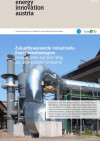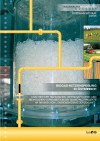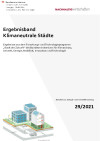Suchergebnisse
Themenworkshop Biobased Industry (5. Dezember 2013, Wien)
Der Workshop bietet einen Einblick in aktuelle österreichische Forschungsaktivitäten zum Thema Biobased Industry. Die Vorträge stehen ab sofort als Download zur Verfügung.
ERA-NET COFUND Smart Cities and Communities (2014 - 2019)
Das Hauptziel des ERA-NET COFUND ist es erfolgreiche Implementierungsprojekte im Bereich Smart Cities zu unterstützen, die einen Beitrag zum technologischen Wandel des traditionellen Energiesystems leisten und integrierte, intelligente Lösungen für Städte und die Gesellschaft anbieten. Öffnung der Ausschreibung: 11. Dezember 2014
IEA SHC Solar Award 2016: Brauerei Göss ausgezeichnet
Für die Nutzung von 100% erneuerbarer Energie in allen Prozessen ging der IEA SHC Solar Award heuer an die Brauerei Göss.
Stadt der Zukunft Themenworkshop Energie! Raum! Planung!
Dieser Themenworkshop ist zugleich der 4. Fachkongress des Projekts "Energieraumplanung für smarte Stadtquartiere und Regionen". Neben der Synthese zu den Themen Stadtquartiere, ÖV-Achsen und interkommunale erneuerbare Flächenpotenziale stehen Vorträge von nationalen und internationalen ExpertInnen am Programm.
Tagung: Kompakte thermische Energiespeicher
23. Oktober 2014
Wirtschaftskammer Österreich
Wiedner Hauptstraße 63, Saal Rudolf SallingerWien, AT
Internationale Trends und österreichische Entwicklungsschwerpunkte werden vorgestellt. Dabei gilt es sowohl das immense Potenzial für kompakte Wärmespeicher darzustellen als auch anhand von konkreten Entwicklungen die Chancen der Technologie für die österreichische Wirtschaft aufzuzeigen.
Symposium: Energiezukunft unserer Gemeinden
31. Mai 2012
Sonnenplatz 13922 Großschönau, AT
Der TDW Großschönau veranstaltet ein Symposium zum Thema EnergieEinsparung-EnergieEffizienz-ErneuerbareEnergie im Kompetenzzentrum am Sonnenplatz Großschönau.
Ausschreibung "Sustainable Urbanisation Global Initiative" geöffnet
Im Rahmen der transnationalen Ausschreibung SUGI Initiative/Food-Water-Energy Nexus haben österreichische Partner von transnationalen Forschungs- und Entwicklungsprojekten die Möglichkeit eine Förderung zu beantragen.
Small scale gasification for CHP
3. - 4. Mai 2017
MCI, Maximilianstraße 2, Innsbruck, AT
IEA Bioenergy Task 33 Workshop zum Thema "Small scale gasification for combined heat and power production (CHP)" und Exkursion zu SynCraft und GE Jenbacher.
Webinar on Solar Energy in Urban Planning
13. September 2017, 12:00 - 13:30 (10:00 - 11:00 GMT)
online
The experts of Task 51 have addressed many challenges and key findings of their work will be presented during a webinar. The speakers will highlight the current status of solar energy legislation for participating countries and present key issues and possibilities associated with the application of solar energy technologies in urban areas. This includes consideration of solar access rights and heritage controls from an urban planning perspective, as well as reviewing legal precedents and comparisons between different local, regional and national jurisdictions. Furthermore, the importance of understanding solar issues in relation to energy and urban planning processes will be highlighted. A brief summary of a range of approaches, methods and tools that supports solar energy in urban planning will also be presented.
Stakeholderdialog: Biobased Industry
4. Dezember 2017, 9:00 – 15:30 Uhr
Rudolf Sallinger Saal, Wirtschaftskammer Österreich Wiedner Hauptstrasse 63, 1045 Wien
Aktuelle Forschungs-und Entwicklungsaktivitäten im Themenfeld Biobasierte Industrie aus der FTI-Initiative „Produktion der Zukunft" und dem Biobased Industries (BBI) Joint Undertaking wurden präsentiert.
Zukunftsweisende industrielle Energietechnologien

Innovationen auf dem Weg zur "low carbon"-Industrie
energy innovation austria
1/2018
Herausgeber: BMVIT und Klima- und Energiefonds
Deutsch, 8 Seiten
Downloads zur Publikation
Biogas-Netzeinspeisung In Österreich

Analysen der technischen, wirtschaftlichen und rechtlichen Voraussetzungen sowie Pilotprojekteim Rahmen von "Energiesysteme der Zukunft"
Forschungsforum
2/2006
Herausgeber: BMVIT
Deutsch, 6 Seiten
Downloads zur Publikation
Berichte aus Energie- und Umweltforschung 3/1996 Emissionsverhalten bei realem RME-Betrieb mit bzw. ohne Oxikat

Vergleichsuntersuchungen mit den Kraftstoffen Diesel und RME
Einfamilienhaus und verdichtete Wohnformen - eine Motivenanalyse

Die Studie konzentriert sich auf die Darstellung der Gründe für die zögerliche Realisierung flächensparender, verdichteter Wohnformen einerseits und für die dominierende Bevorzugung des freistehenden Einfamilienhauses andererseits. Sie beschränkt sich jedoch nicht auf die Deskription der entscheidenden Motive für die jeweilige Wohnoption, sondern analysiert auch die Bestimmungsfaktoren und Rahmenbedingungen, unter denen die jeweiligen Motive entstehen bzw. entstanden sind. Auf der Basis dieser Analyse werden Alternativen vorgeschlagen und hinsichtlich ihrer Effektivität und Realisierungschancen evaluiert.
Mission Innovation 2.0 flankiert Österreichs Weg zur Klimaneutralität
Chile veranstaltete vom 31. Mai bis zum 4. Juni 2021 den sechsten Mission Innovation MinisterInnengipfel (MI-6), bei dem die 2. Phase der Initiative eingeleitet wurde.
Ergebnisband „Klimaneutrale Städte"

Der vorliegende Ergebnisband stellt abgeschlossene Projekte aus dem Forschungs- und Technologieprogramm „Stadt der Zukunft“ des Bundesministeriums für Klimaschutz, Umwelt, Energie, Mobilität, Innovation und Technologie (BMK) im Bereich Klimaneutrale Städte vor. Die gewonnenen Erkenntnisse sollen eine Entwicklung in Richtung energieeffiziente und klimaverträgliche Stadt unterstützen, die auch dazu beiträgt, die Lebensqualität und die wirtschaftliche Standortattraktivität zu erhöhen.
Schriftenreihe
29/2021
Redaktionelle Gestaltung: Bianca Pfefferer, Hannes Warmuth (ÖGUT)
Herausgeber: BMK
Deutsch, 22 Seiten
Downloads zur Publikation
Fabrik der Zukunft - Projektpräsentationen
27. Okt 2008
Haus der Forschung, Sensengasse 1
1090 Wien, AT
Vorstellung der unterschiedlichen laufenden bereits abgeschlossenen Projekte der 4. Ausschreibung, Resüme und Ausblick in die Zukunft.
Forschungsforum Mobilität für Alle 2015
3. Dezember 2015
Austria Trend Hotel Savoyen Vienna, Rennweg 161030 Wien, AT
Die Veranstaltung war dem Thema “Mobilität und Wohnen” gewidmet und gab Einblick in gesellschaftliche Trends und aktuelle Forschungsergebnisse, unter anderem zum Zusammenhang von Wohnstandort und Mobilitätsverhalten. Innovative Lösungsansätze für nachhaltige Mobilität wurden aufgezeigt.
Feasibility study of innovative absorption heat pump processes
A feasibility study of innovative absorption heat pump processes for strategic orientation and further development of heat pumping technology and its applications.
Gründerzeit with future - demonstration project 1: David´s Corner
High value energy efficient refurbishment of an ensemble of three neighbouring Wilhelminian style buildings in a non-lucrative location.
